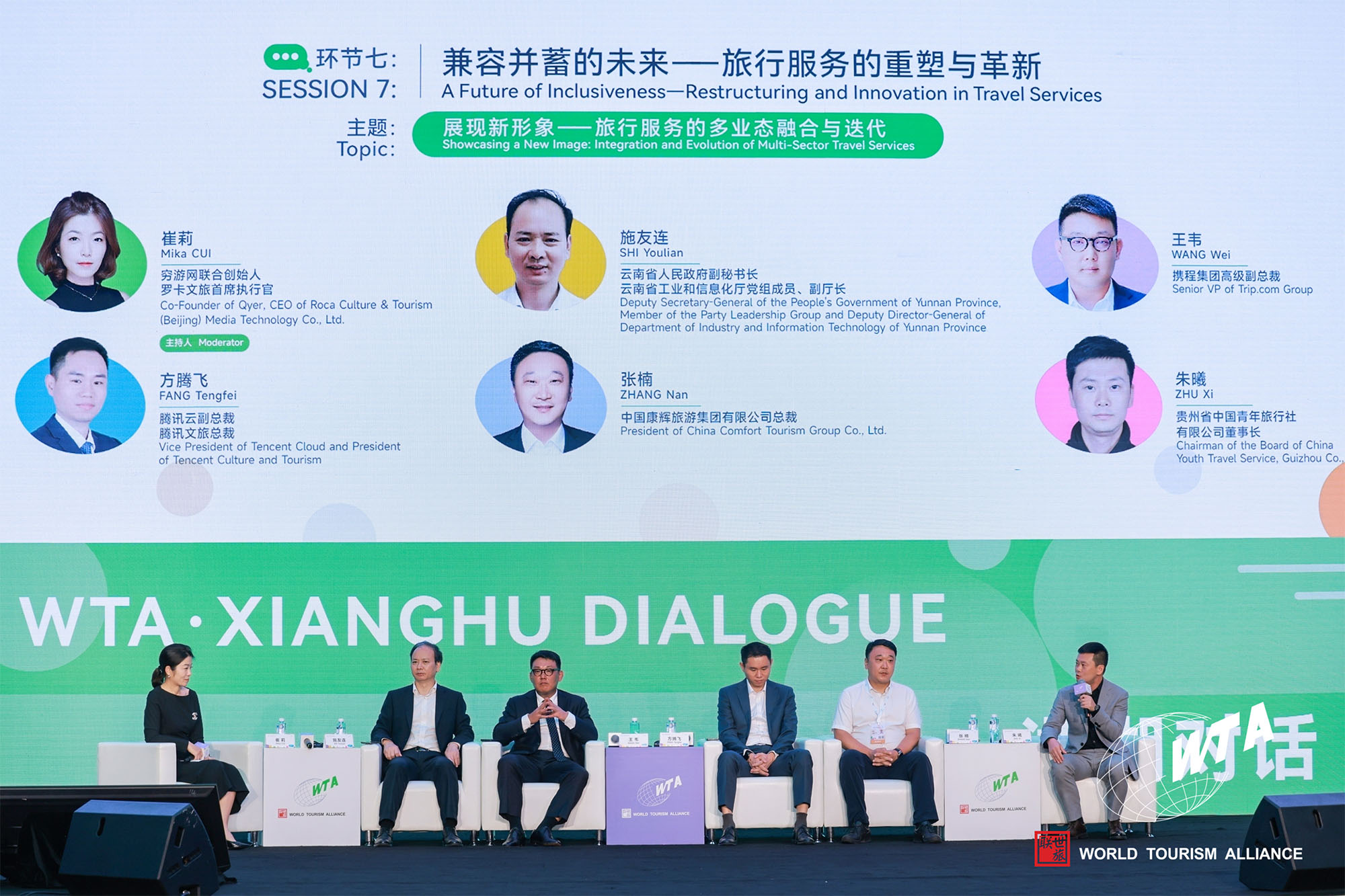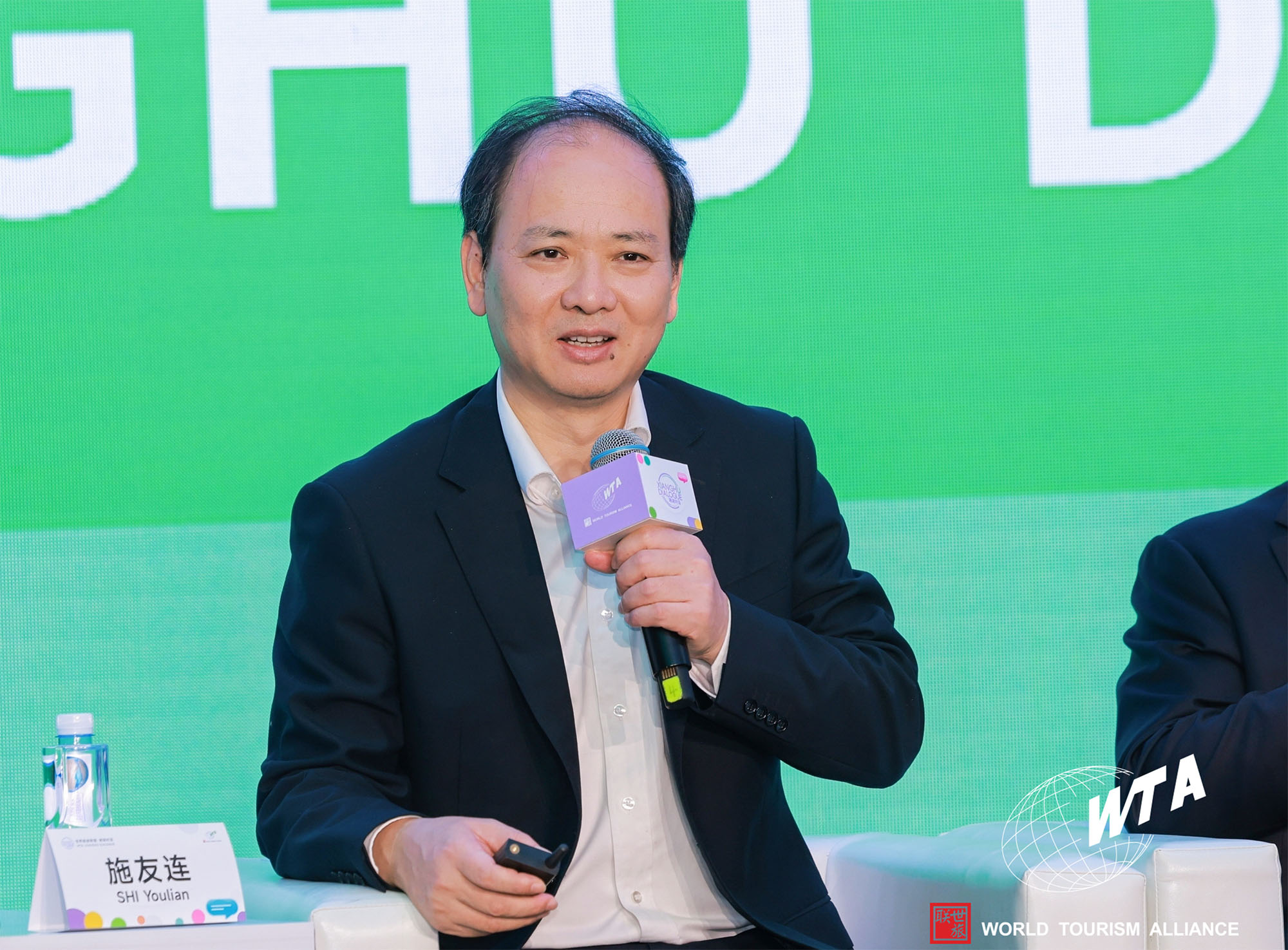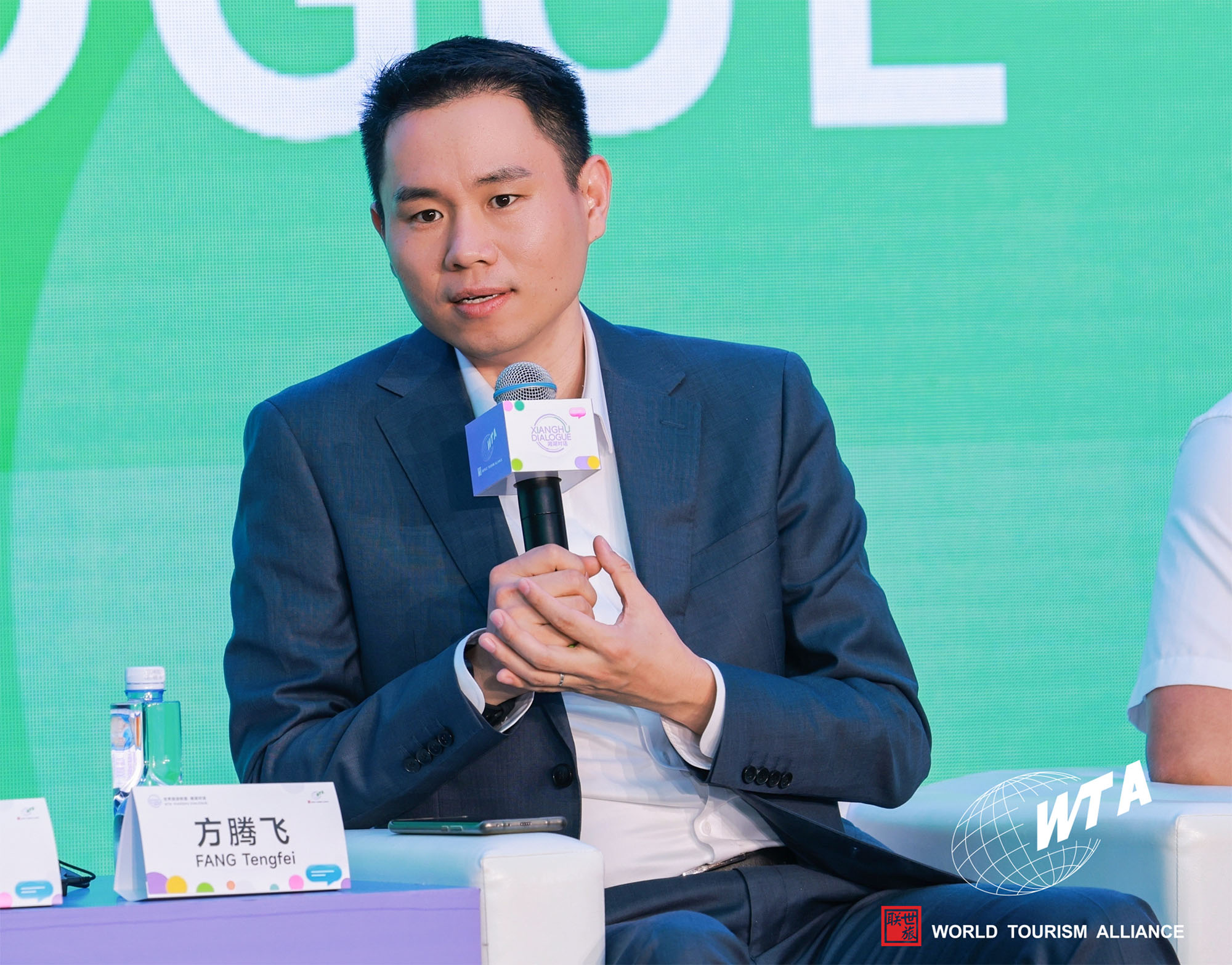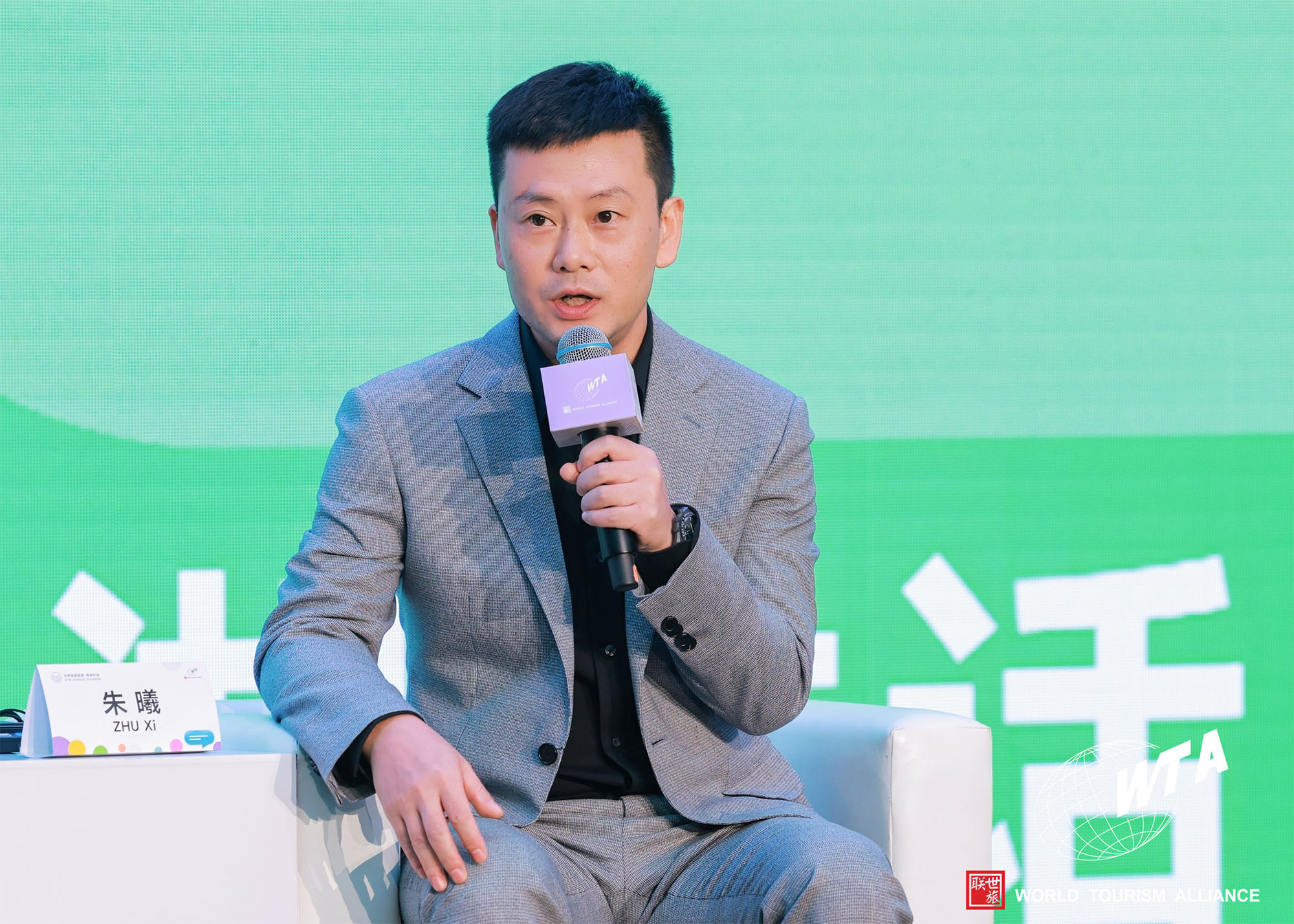2024-11-27
The "WTA·Xianghu Dialogue 2024" was recently held in Sanya, Hainan, where global tourism leaders gathered to share insights on the topic "Showcasing a New lmage: Integration and Evolution of Multi-Sector Travel Services".

Moderator:
Ms. Mika CUI, Co-Founder of Qyer, CEO of Roca Culture &Tourism (Beijing) Media Technology Co., Ltd.
Panelists:
Mr. SHl Youlian, Deputy Secretary-General of the People’s Government of Yunnan Province, Member of the Party Leadership Group and Deputy Director-General of Department of Industry and Information Technology of Yunnan Province
Mr. WANG Wei, Senior VP of Trip.com Group
Mr. FANG Tengfei, Vice President of Tencent Cloud and President of Tencent Culture and Tourism
Mr. ZHANG Nan, President of China Comfort Tourism Group Co., Ltd.
Mr. ZHU Xi, Chairman of the Board of China Youth Travel Service, Guizhou Co., Ltd.
Here is a transcript of the discussion:

Moderator: The current trends in the cultural tourism industry can be summarized with several key terms: investment and growth, diversification and personalization, cross-sector integration, focus on quality and experience, sustainable tourism, global expansion, penetration into lower-tier cities, and rising consumer expectations. As these trends evolve, the tourism market is driving the creation of new demands, products, scenarios, and business models. Today, we’ll focus on the integration and iteration of multiple business models in tourism services. I believe three cases are worth noting. First, the domestic AAA game Black Myth: Wukong, which has significantly boosted Shanxi’s cultural tourism industry and achieved remarkable success in destination marketing. Second, the "Wilderness Nation—Lijiang Art Torch Festival". This theme park is an upgraded iteration of conventional theme parks, built entirely from repurposed materials and enriched with music and art festivals. Third, Europe’s kayaking travel experiences, which span multiple destinations, include an innovative initiative: visitors who collect litter can kayak for free. This program has successfully gathered 134 tons of waste, exemplifying a renewed and iterative approach to sustainable tourism. Currently, digital tourism is now a hot topic. Let’s hear from our experts about their practices and explorations in this field.

Mr. SHI Youlian: The two key concepts for the cultural and tourism industry today are rebranding and transformation. How can we rebrand, and where should we transform? The answer is undoubtedly digitalization. With strong support from the central government, Yunnan has leveraged its geographical advantages and developed a robust foundation for coordinated progress. The top-level design for major connectivity projects has been completed, and key projects are being launched this year. For example, on July 10, the Ministry of Industry and Information Technology approved an international communication gateway development plan, including Kunming and other cities, to support full-service operations. Yunnan is actively developing a Digital Tourism Outbound Base, focusing on the service sector and tourism. Tourism is more than an economic trade sector—it is a key player in cultural exchange, fostering mutual understanding and advancing broad strategic consensus. We have positioned digital tourism as the cornerstone of our information superhighway initiative. The potential for digitization in tourism is vast, spanning accommodation, transportation, dining services, smart technology, equipment technology, and information platform development. China is experiencing explosive growth in this sector. Yunnan’s Digital Tourism Outbound Base aims to build a digital network space for collaboration with Southeast Asia, opening new pathways for expanding tourism services into South and Southeast Asian markets. We are planning two key projects: 1. South Asia and Southeast Asia Tourism Network: This initiative will establish five key connections among scenic spots, travel agencies, transportation systems, border advisory services, and consumers. These connections will pool resources to offer diverse and customized services to tourists. 2. "One Device for Two Asia Regions" Project: This project will enable seamless tourism experiences in South and Southeast Asia, driving the development of major connectivity projects and uplifting the overall tourism industry in these regions.

Mr. FANG Tengfei: Tencent is actively embracing the current wave of artificial intelligence. The evolution and iteration speed of general AI in the past two years has exceeded all expectations. Tencent has invested heavily in developing its proprietary Hunyuan large language model, which now surpasses one trillion parameters and ranks among the global leaders in performance. Internally, more than 700 applications and scenarios at Tencent have integrated this model. Regarding the combination of AI with cultural tourism scenarios, we have made some preliminary predictions. Based on our analysis, general AI is likely to have a profound impact on online travel agencies (OTAs) and online travel platforms (OTPs). For instance, travelers can now simply tell AI their travel plans, budgets, and preferences through voice commands. The AI can then call up relevant applications on the smart phone, retrieve information, and provide generative content services. Looking ahead, the need for multiple apps or keyword searches to book travel will disappear. AI models will allow travelers to express their needs in any language, and the system will generate and recommend personalized options, completely transforming the booking process. With AI’s rapid development, highly customized, robot-centered service models will become the mainstream in tourism. In physical locations like hotels, scenic spots, and theme parks, robotic services will increasingly integrate into daily experiences. General AI represents a revolutionary innovation, poised to drive disruptive change across the industry.

Mr. WANG Wei: The tourism industry has experienced rapid development over the past 40 years, and the travel habits of Chinese residents have changed significantly. Personalized and diverse travel demand is growing rapidly. While there is potential for general AI to replace OTAs, this possibility remains distant. At Trip.com, we began building our big data capabilities in 2012-2013 and achieved early advancements in smart cloud-based customer service. Our AI development started two to three years ago, and today, over 90% of our operations rely on AI and algorithms. We believe AI has a transformative role in the tourism industry. In addition to technological development, we have been focusing on training talent to stay ahead. For years, Trip.com has partnered with thousands of offline travel agencies to promote training for customized travel planners. Since 2020, Trip.com has collaborated with educational authorities on the 1+X certification project to cultivate high-end custom travel professionals. Currently, there are over 6,000 certified travel planners active on our platform. We also plan to establish a driver-guide certification system. Drivers are no longer just providers of transportation; they often act as cultural ambassadors, introducing local traditions, cuisine, and attractions. We will implement a tag-based management system to shift the focus of service evaluation from fleet operators to individual drivers, providing outstanding drivers with better resources and support. Trip.com’s new business segments have grown rapidly. From 2019 to 2023, custom travel grew by 30%, while private car tours and driver-guide services surged by 400%.

Mr. ZHANG Nan: In this era, traditional travel agencies must embrace the internet, whether by collaborating with OTAs or partnering with new media. For travel agencies, success lies in improving internal strengths and enhancing service quality. Internally, we emphasize three dimensions of value: functional, emotional, and social. Historically, we focused primarily on functional value. Today, we aim to deliver emotional value and extend into social value. Emotional value centers on two aspects: 1. Service Quality: Traditional travel agencies excel in ground services. For example, we have established service standards specifically for travelers with disabilities. We successfully organized outbound tours for visually impaired travelers, enhancing their travel experiences with emotional value. 2. High Standards: Concord specializes in high-altitude adventure tourism. This year, we, with our rich experience and strict standards, supported a scientific expedition team in the Kunlun Mountains, providing 11 days of field services and camping at 5,100 meters above sea level for three nights. More tourists are showing interest in combining "Tourism+Sports", "Tourism+Performing Arts", and family activities. Concord partnered with the Beijing Football Association to transform ticket sales for Guoan team’s home games into family sports day tours. During the day, families participate in sports activities and watch the game in the evening. In 2023, Concord sold tickets and accommodations for the Beijing Short Track Speed Skating competition, bundled with local tourism services. The bundles were so popular that they sold out in just four hours. Concord has also developed expertise in extracting cultural and creative elements from scenic spots. Our end-to-end process includes IP development, design, modeling, and production, integrating cultural products into sightseeing and enhancing marketing strategies to attract more visitors.

Mr. ZHU Xi: Travel agencies are a regulated industry with defined entry standards. Agencies are required to pay a quality deposit and obtain a special license, which underscores their professional nature. Tourists expect professional services, and this is where our competitive edge lies. For travel agencies, the current flow of customers is safeguarded by industry barriers to entry. For example, travel agencies in source regions are responsible for assigning customers to destination agencies. This mutual trust and support within the system ensures that customer flows are not easily transferred to new or inexperienced brands. This structure maintains the vitality of traditional travel agencies in the short term. However, the future of travel agencies’ rebranding, upgrading, and transformation will rely on talent. The types of talent a company has will determine its strategy and product direction. Therefore, building a comprehensive talent development system is our top priority. In Guizhou, we established a talent association supported by the tourism market to train specialists. We have designed and implemented various training programs focusing on niche areas to create more professionals and guide travel agencies toward specialized market segments. The rise of cultural-tourism integration, sports-tourism integration, health-tourism integration, and wine-tourism integration highlights the trend of market segmentation. Travel agencies no longer need to pursue broad, comprehensive services; focusing on a specific niche can achieve profitability. Our company specializes in the health tourism segment, which provides emotional value to users. Health tourism is not just for seniors; middle-aged and younger people also need these services, making this the largest potential market. We integrate six key tourism elements with health concepts, including: Food and medicine synergy, Wellness-oriented living environments, Specialized transportation, Destination entertainment services, Shopping systems aligned with health standards. Our message to users is clear: health tourism can rejuvenate your mind or improve your physical well-being. Traditional tourism sells services, not just products; future rebranding and transformation of travel agencies will depend on combining innovative products and exceptional services, driven by a talent-focused strategy to accelerate specialization in niche markets.
Moderator: Can you summarize the future trends of the tourism industry with a brief closing remark?
Mr. SHI Youlian: The future lies in embracing the digital age and pursuing international digital tourism. Aligning with national strategies, we will implement a unified digital tourism network in Yunnan and explore new global digital tourism opportunities.
Mr. WANG Wei: I hope every destination will focus on accommodation-centered leisure and vacation services, continually meeting consumer demands.
Mr. FANG Tengfei: In the future, digital technologies, represented by AI, will take root in the tourism industry, making it an ideal testing ground for the most cutting-edge innovations.
Mr. ZHANG Nan: Traditional travel agencies should focus more on enhancing and iterating product content. By integrating tourism with related industries and future technologies, we can provide visitors with the best possible experience.
Mr. ZHU Xi: The future of travel agencies depends on the vision and openness of their leaders. The era of digitalization and informatization is coming, and I look forward to more innovative digital transformations within the industry.